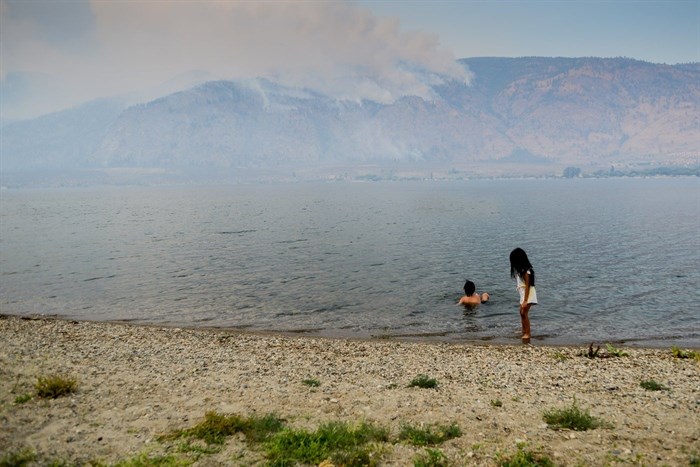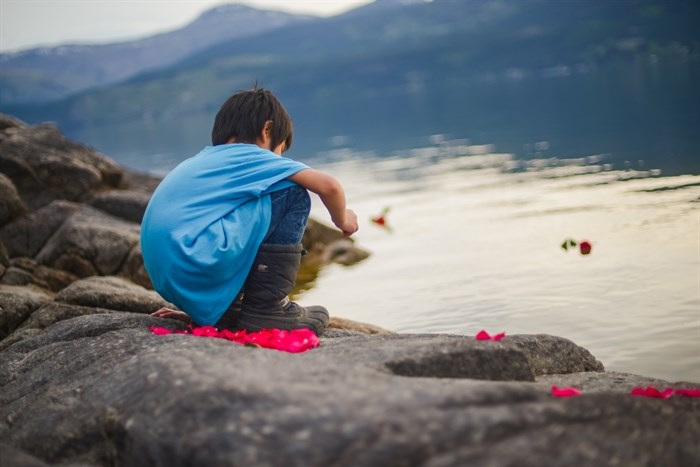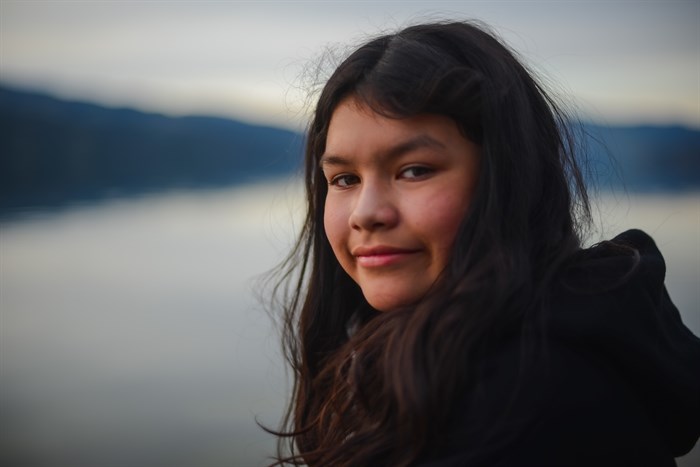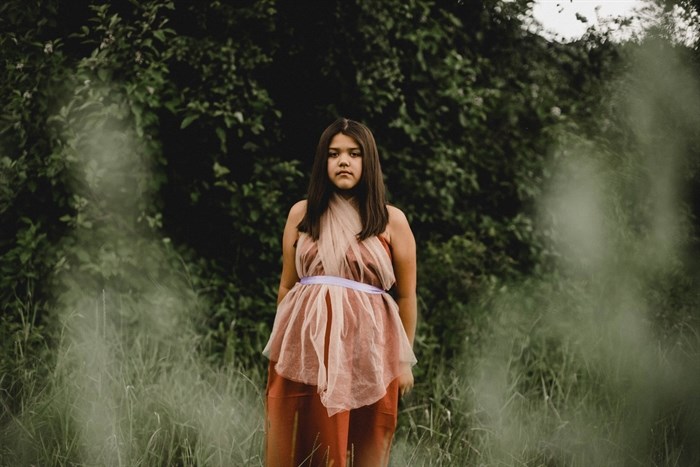
kilawna and palwícya, young syilx children being raised to make kin with their syilx homelands, overlooking Nk’Mip Creek wildfire in June, 2021.
Image Credit: Kelsie Kilawna, Local Journalism Initiative
August 19, 2021 - 7:00 PM
Over the summer, unprecedented wildfires have been sweeping through lands that have held the prayers, energy and spirit of the syilx people for generations.
On July 13, a report came in to B.C. Wildfires about a fire spotted near Douglas Lake Ranch in syilx territory northeast of Vernon. That fire has since been dubbed the White Rock Lake Fire, and it’s spread over 81,000 hectares in the Okanagan, creeping into the northern end of the Okanagan Indian Band — my community.
I had taken the day off with my children to scout out a spot for berry picking on txitqin (t-hee-t-can) mountain. We drove to the top of the mountain, looked south and saw smoke billowing from the trees. It looked to be three mountains away from us, so I was not concerned.
But as we continued down the mountain, flames started shooting from the trees above us. I had misunderstood the fire and was immediately consumed with sheer terror — my body froze and began to shake uncontrollably, my throat closed and I felt like I couldn’t breathe.
I can’t explain what happened, but my body was overtaken with the most immense fear I’ve ever felt in my life.
“I think you seeing that fire and having that reaction was a premonition of what was to come from this same fire,” my sister, Lauren, would tell me a few days after witnessing my response.
I turned my vehicle around and sped back over txitqin and into safety. From that moment, I knew that fire was going to be destructive, and everything was about to change for us.
timxw (life force) as we know it
Since that day in July, all of the places that my family and I have done ceremonies on have burned. The waterways we laid our bodies and prayers in — take my pain from me, take my sadness from me, fill me with peace, fill me with hope — are now consumed by blackened trees and plants.
At times over this past year, as bodies continue to be uncovered on the sites of former residential “schools,” I felt I wanted to return my body to the land. I felt hopeless, and was taken care of by the land. These places, where I gave the land my grievances and was cared for, have now burned.
We are to visit our lands and sacred places in times of great sorrow, but also in times of great joy. For the land to fully know us, it must know us in both sadness and joy.
We did that work together, me and my three children.
We have an abundance of memories from the places where we picked berries with our Elders and grandmothers who have since moved on to the spirit world. Hunting grounds that the men in my family fed generations of people with. Training grounds where children became men and women — now blackened by the fires.

kilawna Marchand, my youngest son, sends off prayers to the water at Okanagan Lake in his own way.
Image Credit: Kelsie Kilawna
With every footstep on the land, we exchange energy with it, and the timxw (life force) knows we are there to visit and they are happy.
As our teaching goes, the land loves me because I love the land.
For me, this loss has been devastating. I keep repeating to myself — it’s not gone, it’s changed, it’s renewing itself.
But I feel a returning sense of loss, not being able to go to my ceremony sites, so they can help me in the way they always have. It’s my children who teach me now. They are my medicine in this time and always, and I remain grateful that they chose me as their mother.
Fire management is living a sqilxw life
skookamina and smúk?a?xn, my two eldest children, have both been raised traditionally by a large circle of people who share the responsibility of bringing them up in this world.
My children’s connections give them multiple perspectives and teachings. They do not just hear my worldview and experiences, and they are being raised to be responsible to the collective and to always think of others in their actions — now and for future generations, while paying respect to the teachings of those before them.
Because they are a product of the many that have participated in raising them, I am always learning from my children.
This year, as with past years, the children were on the land, working the land. skookamina, who’s 13, helps his family with traditional burning practices, burning the debris and dead plant life around their homes to encourage new life and prevent wildfires in the area.
He has been taught that they practiced traditional burning to prepare for the “Great Fires,” a prophecy that has come true over the past weeks. skookamina has been taking part in the burnings since he was born.
“We are preparing for the Great Fires,” he says. This teaching was handed to him by his aunty.
This year, prior to the fires, he helped repair piping to the wildlife basin that was meant to provide water to animals in the hills of Blacktown (an area in our community), in case of wildfire. He also deconstructed human-made dams in the creeks, so that water could flow freely for the animal kin.
I ask him if sqilxw (People Indigenous to the land) are themselves a kind of fire management.
“Of course, and I’ll teach my children what I’ve been taught, and my granddaughters and grandsons,” he says.

kilawna Marchand, my youngest son, sends off prayers to the water at Okanagan Lake in his own way.
Image Credit: Kelsie Kilawna
I ask my daughter smúk?a?xn if she also helped with the controlled burnings.
“No,” they tell me. “I helped with the kids, which is just as important.
“I teach the little ones to stay with me on the land and show them how we gather things so that the animals will always have something to eat, and so we are not over-harvesting in one area [because] that damages the land,” they say.
Both of my children continue to pray and ceremony over the lands as they were trained to do from birth.
‘Other areas of our land miss us’
Teachings from skookamina and smúk?a?xn are getting me through this time.
I was feeling overly concerned with their lack of upset over the loss of our ceremony places, but my son reassured me it was all going to be okay, and to remember our teachings.
“Yes, it’s sad of course, but we have an entire territory, and those other areas of our land miss us too,” he says.
He’s right. The land we haven’t visited probably misses our feet, our prayers, our ceremonies, and our joy.
Because my children are being raised to ceremony for the whole territory, to them the reserve is a small colonial construct, and although it’s a loss we can grieve, it’s also part of our ways to continue on.
“Back a long time ago when things like this happened we took care of it and moved on to somewhere else. I just know we still have so much more,” skookamina says.

skookamina Marchand, is being raised by over thirty people who have agreed to be part of his life ceremony as a syilx.
Image Credit: Kelsie Kilawna
“As long as we have our children and our families, we are home. We are home wherever our people are and as far as our language can go,” says smúk?a?xn.
So as my children teach me again to remember, we pick our hearts off the ground. We will help to restore the land and the animal kin, and we will go and begin to reciprocate our love with other places in our territory.
It’s still there for us and maybe I forgot that.
If you or someone you know needs mental health and wellness supports please know help is available. Check out all the resources available to you here. For example, the KUU-US Crisis Line Society offers 24-7 support at 250-723-4050 for adults, 250-723-2040 for youth, or toll-free at 1-800-588-8717.
Editor’s note: This article contains content about suicidal ideation and loss from wildfires that may be triggering. Kelsie Kilawna is a syilx reporter who’s covering wildfires that have been spreading through her community and homelands. Kelsie is committed to syilx storytelling protocol and trauma-informed reporting.
Protocol: According to nsyilxc?n language keepers, there are no capitalizations in the spellings of any nsyilxc?n words. In an egalitarian society, capitalization insinuates there is something that holds more importance over another, and that does not fall in line with syilx ethics.
— This story was originally published by The Discourse and IndigiNews.
News from © iNFOnews, 2021